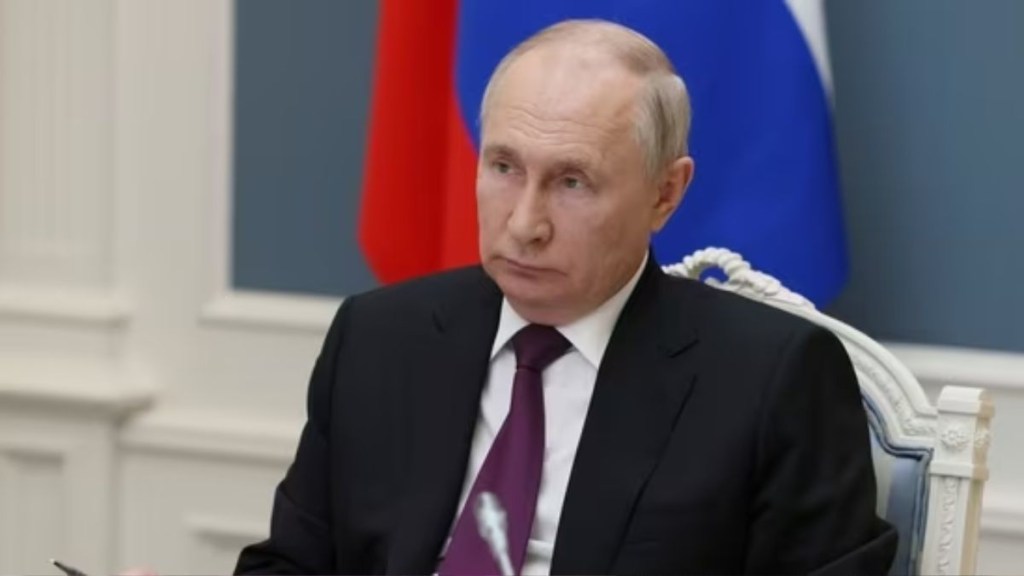In a virtual address to the Russian cabinet, Russian President Vladimir Putin, asserted that Moscow holds a moral obligation to deliver humanitarian aid to the civilian population in Gaza. This sentiment was echoed during his participation in the G20 Virtual Leaders Meet under India’s presidency, where he spoke about the dire situation in Palestine, specifically highlighting the challenges faced by the civilian population in the Gaza strip.
Putin expressed deep shock at the necessity for doctors to perform surgeries on children, including abdominal surgeries, without anaesthesia. He referenced the Secretary-General of the United Nations’ statement describing Gaza as a vast children’s cemetery. The Russian President, during the G20 meeting, also addressed allegations regarding peace negotiations with Ukraine. He clarified that Russia had not refused negotiations; instead, Ukraine publicly announced its withdrawal from the negotiation process, accompanied by a decree prohibiting further negotiations with Russia.
Reflecting on the events in Ukraine, Putin acknowledged the shocking nature of the 2014 coup and the subsequent conflict in Donbass. This acknowledgment came during discussions with other BRICS leaders, where he shared his emotional response to videos depicting Palestinian children undergoing surgeries without anaesthesia.
Earlier in the month, the World Health Organization (WHO) accused Israel of routinely targeting medical facilities, leading to everyday child deaths in the besieged Palestinian enclave.
Extraordinary BRICS Meet on the West Asia situation
South Africa convened an extraordinary meeting of BRICS to discuss the issue of Hamas-Israel conflict earlier this week. This was an important initiative in the sense that no such meeting was called earlier by this grouping. All BRICS states agreed on two issues: providing humanitarian aid to Gaza, and the two-state solution of the Palestinian conflict.
During an extraordinary BRICS virtual summit, Putin conveyed deep concern over the significant loss of life, mass displacement of civilians, and the unfolding humanitarian catastrophe.
While recognizing the immediate importance of securing humanitarian truces, Putin stressed Moscow’s commitment to achieving lasting peace in the region. He underscored that such lasting peace could only be realized by adhering to previous UN resolutions advocating for the creation of two states – Israel and Palestine.
Putin asserted that other BRICS member states shared Russia’s stance, citing their voting patterns at the UN General Assembly. He argued that the BRICS group, collectively, could play a pivotal role in resolving the longstanding Israel-Palestine conflict.
In a report to the UN Security Council, WHO Chief Tedros Adhanom Ghebreyesus disclosed alarming statistics, stating that, on average, a child was killed every ten minutes in Gaza. He detailed Israel’s attacks on medical facilities, ambulances, and patients, resulting in over 250 incidents since October 7, severely impacting Gaza’s medical infrastructure.
Expert Speak
However, “a granular analysis demonstrates the differences in the sensitivity of BRICS states. South African President, Cyril Ramaphosa, used strong words, calling for an immediate ceasefire and describing the condition in Gaza as genocide. He also linked the crisis to the suffering of Palestinians for the last 75 years. In a somewhat shift in its approach, he criticised Hamas for violating international law,” Prof Rajan Kumar, School of International Studies opines.
Adding, “the South African leader demanded an immediate ceasefire so that humanitarian aid could reach the people in Gaza. Russia has also stated earlier that Israel has moved far beyond its right to defend and blamed the US for blocking the resolution on immediate ceasefire.”
Sharing his opinion with Financial Express Online, Prof Rajan says, “India’s External Affairs Minister, S Jaishankar, blamed the Hamas attack on Israel for the trigger of this conflict. However, he elaborated India’s position stressing that a two-state solution is necessary to resolve the Palestinian problem. He also referred to New Delhi’s humanitarian aid to Gaza.
China’s President Xi Jinping reiterated the demand of an immediate ceasefire and called for an international peace conference on this issue. China has been consistent in supporting Palestine. It has never condemned Hamas as a terrorist organisation.
“The advantage of the BRICS Plus is that it has both Iran and Saudi Arabia. Iran is the most critical player as far as the Hamas issue is concerned. BRICS can play a constructive role in pressuring the West for a ceasefire, creating an alternative international opinion and countering the western narrative,” says Prof Rajan.
BRICS initiative demonstrates how this forum is becoming more assertive and is willing to play a greater role in global governance.
